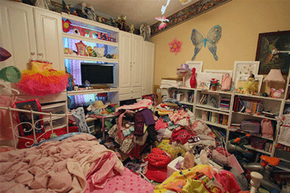Some of what we are is genetic destiny. If your parents both have light eyes, you will have light eyes. If you're born with at least one gene for brown hair, your hair will be brown. The only way to escape it is a dye job.
And then there are inherited genes that mark a tendency -- an increased possibility over the general population that the inheritor will develop a particular behavior or condition. In the case of genetic predisposition, the outcome is not guaranteed; it is simply more likely than it is for someone without the gene. Some common examples of this are breast cancer, alcoholism, obesity and athletic ability. They run in families, but in each case and to varying degrees, the inheritor's habits and behavior may affect the outcome.
Hoarding disorder appears to fall into this category of genetic predisposition. Opinions vary on how strong that disposition is. Some experts believe genetics play a relatively small role, with environment taking center stage. In other words, if your biological father is a compulsive hoarder but you're adopted at birth, any genetic predisposition toward hoarding would be less likely to be "turned on" than if you were raised by your genetic parent.
Another big component in the development of hoarding disorder is a stressful incident, such as sexual assault or divorce. Trauma can be an instigating factor in the disease, which is often associated with anxiety. If you inherited a genetic proclivity toward compulsive hoarding and you experience a period of extreme stress, you may be more likely than someone without the gene to start practicing the behavior as a coping mechanism.
Some recent studies, on the other hand, point to a more significant role for genetics in hoarding behavior, to the extent of having isolated a specific chromosome that may be associated with hoarding. Some researchers believe this type of genetic inheritance to be a stronger factor than environment, although no one is sure whether the gene indicates a tendency toward actual hoarding or toward a contributory personality trait, such as disorganized thinking.
What is not up for debate is the malleability of the gene's outcome. Whether or not genetics play a part in hoarding, and whether or not it's a strong one, people who inherit a tendency toward the behavior are not locked into a pathologically cluttered future. Just as someone with strong athletic capacity can simply not play sports, a person who inherits a strong hoarding capacity can simply not collect.



